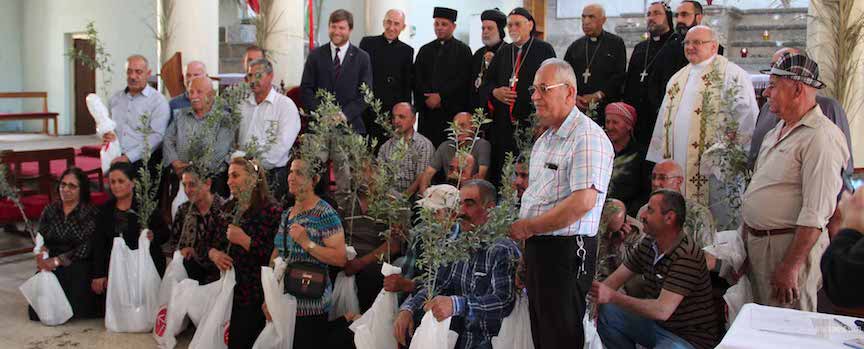Earlier this month, Aid to the Church in Need USA (ACNUSA) – a papal agency I chair that supports persecuted Christians – participated in a U.N. conference co-sponsored by the Permanent Observer Mission of the Holy See to the United Nations. The session’s theme was sweeping: “Bringing Accountability, Rehabilitation, Reconciliation, and Peace to Areas Ravaged by ISIS.”
Participants praised Resolution 2379, passed this fall by the U.N. Security Council. It calls for the creation of a team of investigators to collect evidence of ISIS crimes against humanity and eventually to try and convict the perpetrators. I welcome the Resolution and hope the international community will act on it. Expectations also run high for other big initiatives that depend on massive funding and significant political action on the part of Western and regional governments.
Vice President Mike Pence’s pledge that America will channel aid more directly to persecuted religious minorities in the region is cause for great hope. Yet the wheels of government bureaucracies turn slowly. Meanwhile, the battered communities on the ground – Christian, Yazidi, Muslim – need immediate action.
The focus should be on the resettlement of some 90,000 Christians on northern Iraq’s Nineveh Plains. That region was devastated under ISIS occupation and by the subsequent battles to liberate the ancient Christian heartland. To date, only 12 percent of that population has returned from exile in Kurdistan, where they spent more than three years.
Hosted by the Chaldean Archdiocese of Erbil under Archbishop Bashar Warda, they survived thanks to food, shelter, and medicine provided exclusively by faith-based agencies. The Knights of Columbus, Catholic Near East Welfare Association, and Aid to the Church in Need were the major contributors. Western governments stood on the sidelines, while faith-based funding enabled the local Church to deliver an enormous amount of humanitarian aid for more than three years.
With winter fast approaching, humanitarian aid must continue. The homes, schools, and hospitals serving returning Christians – and of course churches, convents, and seminaries – as well as the water and electricity infrastructure of the nine Christian towns and villages on the Nineveh Plains are all in need of major repair.
There is also an urgent need for security measures, including de-mining. Major outside funding is needed to pull off what we’ve labeled a regional “Marshall Plan.”
It’s also high time for an aid program that will put these long-suffering Christians – particularly the younger generation – in a position to begin to rely on their own resourcefulness to lay a foundation for the future. Western governments and faith-based organizations must provide – I borrow the words of Hungarian Ambassador Katalin Bogyay, one of the speakers at the U.N. session – “smart, long-term, and sustainable help.”

Governments and NGOs have to be urged to collaborate in a holistic aid program that addresses all the needs of this embattled community: from basic humanitarian needs – food, medicine, shelter – to economic recovery; education; mental, emotional, and spiritual healing; and the promotion of active citizenship committed to the welfare of everyone, regardless of faith, in local communities. The point is to strengthen and revitalize the will and imagination of people to rebuild their own lives and communities.
Beyond humanitarian needs, Christian families seeking to return to the Nineveh Plains will need help not only with the repair or rebuilding of their homes but also with job opportunities. These must be created through micro-investing, providing seed money to begin operating old and new businesses. Economic development will create social stability, allow people to reclaim and rediscover the dignity of work, and incentivize an ancient Christian people to remain.
Towards that end, young adults willing to remain in their country and eager to be trained in various trades should be offered scholarships. These young men and women – committed to the rebuilding of their communities – will be the Christian lay leaders of the future.
There’s great need for a mental health clinic that will help individuals, especially children, regain emotional and mental stability after the trauma of war, terror, and displacement. Specially skilled social workers (some trained through scholarships) will be crucial to establishing community outreach programs aimed at restoring stable, nurturing family environments.
ACNUSA will also be active in helping to boost the recovery by building or repairing schools and churches, the two key community-forming institutions.
Last, but not least, a local NGO staff has to be created with particular expertise in inter-religious relations. It should stimulate civic engagement among different members of the community. This program will be indispensable if there’s to be any hope for the establishment of pluralist, tolerant, and democratic communities.
Three years ago, Pope Francis, in a joint statement with Bartholomew I, the leader of the world’s Orthodox Christians, proclaimed:
Many of our brothers and sisters are being persecuted and have been forced violently from their homes. . . .It even seems that the value of human life has been lost, that the human person no longer matters and may be sacrificed to other interests. And, tragically, all this is met by the indifference of many.
These efforts will not be successful if we do not strengthen the local Church. As a papal foundation, ACNUSA’s work is done from the perspective of a Church that has an unfailing faith in the ability of men, women, and children, with God’s help, to overcome hardship and defeat the powers of darkness. We will be rebuilding places of worship, and also providing priests and nuns with living expenses in order to maintain the health of the faith community’s sacramental life.
These long-suffering Christians, targeted precisely because of their faith, cannot be neglected. They are our brothers and sisters. A comprehensive, “smart, long-term and sustainable” aid program holds the key to success. It will signal the ultimate defeat of the designs of ISIS to eradicate Christians from the Middle East.
Support The Catholic Thing today with your tax-deductible contribution

















